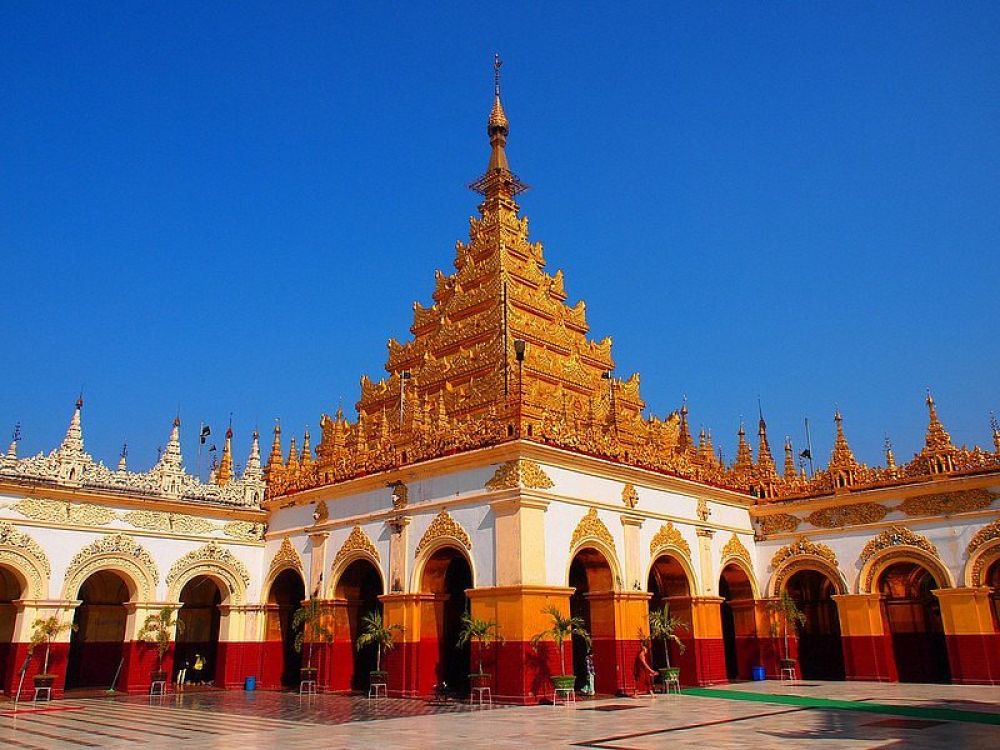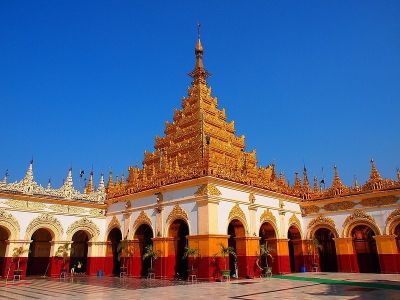

Embark on a guided tour of the Mahamuni Pagoda, one of Myanmar's most revered Buddhist temples, located in Mawlamyine. As you wander through the temple complex with a knowledgeable local guide, you'll learn about its history, architecture, and the significance of the Mahamuni Buddha image that is highly venerated by pilgrims from all over the country. Your guide will recount tales of ancient traditions, explain the daily rituals performed by monks, and point out intricate carvings and decorations that adorn the temple. You may also have the chance to observe local worshippers paying their respects and applying gold leaf to the Buddha image, a merit-making practice that has left the statue covered in layers of gold.
Experience the serene beauty of dawn or dusk at the Mahamuni Pagoda with a viewing activity that allows you to absorb the spiritual atmosphere of Mawlamyine at the beginning or end of the day. Watch as the first rays of sunlight or the warm glow of the setting sun illuminates the golden stupas, creating a picturesque scene that's perfect for contemplation and photography. The panoramic view of the city from the pagoda adds to the enchanting experience. Please remember to dress respectfully and be mindful of worshippers during these times as the temple is an active place of worship.
Mahamuni Pagoda offers a tranquil environment that is ideal for meditation. Visitors can join a meditation session led by experienced practitioners or monks, who will guide you through the principles of mindfulness and Buddhist meditation techniques. This activity is beneficial for those seeking inner peace, clarity, and a deeper understanding of Buddhist teachings. Surrounded by the sacred ambience of the Pagoda, meditators can focus on their practice, while absorbing the peaceful energy of the place. Suitable for both beginners and experienced meditators, a session here can be a transformative experience, connecting you to the cultural and spiritual essence of Myanmar.
Participate in a unique cultural workshop at the Mahamuni Pagoda, where local artisans teach visitors about traditional Burmese crafts. Workshops might include the art of gold leaf making, a significant craft associated with the pagoda due to the tradition of applying gold leaf to Buddha images. Visitors can also learn about stone carving, woodworking, and other local arts. These workshops allow you to gain hands-on experience and a deeper appreciation for the skills and cultural heritage that have been preserved for generations in Mawlamyine. Not only do you learn, but you also support the local community by engaging in these cultural activities.
The Mahamuni Pagoda is an excellent location for photography enthusiasts. Join a photography walk and capture the architectural splendor and cultural vibrancy of this sacred site. With an expert guide, you will explore various vantage points to take stunning photographs, learn about the best lighting conditions, and understand how to frame compelling compositions. From capturing the details of the temple's decorations to the candid moments of daily worship, this activity is designed to enhance your photography skills while preserving the memories of your visit to this remarkable place.
Witness the humbling alms-giving ceremony at dawn around the Mahamuni Pagoda, a daily ritual where local Buddhists offer food and essentials to monks as a way of making merit. Visitors can participate by respectfully offering alms, which can typically be purchased nearby. Participation in this sacred tradition provides a rare insight into the local culture and the importance of Buddhism in the lives of Mawlamyine's residents. Remember to dress conservatively and to follow the local customs during the ceremony to show respect for the religious practices.
No visit to the Mahamuni Pagoda is complete without immersing yourself in the local cuisine. Venture to the surrounding neighborhood to taste traditional Burmese dishes from street vendors and small eateries. Sample delicacies such as Mohinga, the national dish of Myanmar, featuring a rich fish broth with noodles, or try the savory snacks like samosas and spring rolls. Exploring the culinary scene around the pagoda is an adventure in itself, allowing you to taste the flavors of Mawlamyine while observing the bustling local life. While no official food tours are facilitated by the pagoda, self-guided exploration or map-based guides are available.
For those looking to give back to the community during their visit to the Mahamuni Pagoda, engaging in charitable volunteering activities can be a fulfilling experience. You might participate in maintaining the cleanliness of the temple grounds, assist in educational programs for local children, or contribute to ongoing conservation efforts. These activities may provide an opportunity to work alongside local volunteers and monastics, fostering a sense of cultural exchange and personal growth. Volunteering can be a profound way to connect with the essence of the site beyond its role as a tourist attraction.
Enjoy an evening of traditional Burmese music and dance performance at Mahamuni Pagoda or nearby venues, celebrating Myanmar's rich cultural heritage. These performances showcase the grace and elegance of Burmese classical dance, the drama of the masked dances, and the resonant sounds of traditional instruments like the saung-gauk (harp) and pat waing (drum circle). It's an enchanting experience to witness local artists convey stories and themes through the universal language of performance art. Events are typically held during special festivals or occasions; check the local schedule for performances during your visit.
For those interested in deepening their understanding of Buddhist philosophy and spirituality, Mahamuni Pagoda may offer sessions of teachings and discussions led by resident monks or visiting scholars. These gatherings focus on various aspects of Buddhism, from the basic teachings to more complex philosophical discussions. Engaging with these teachings can be enlightening for visitors keen to explore the intellectual and spiritual roots of the faith that influences much of the local culture. As these sessions are usually offered as a form of dana (generosity), participating monks do not charge fees, but donations are customary and support the monastic community.
